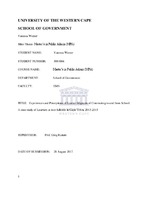| dc.contributor.advisor | Ruiters, Greg | |
| dc.contributor.author | Wiener, Vanessa | |
| dc.date.accessioned | 2018-03-14T10:33:10Z | |
| dc.date.available | 2018-03-14T10:33:10Z | |
| dc.date.issued | 2017 | |
| dc.identifier.uri | http://hdl.handle.net/11394/5766 | |
| dc.description | Masters in Public Administration - MPA | |
| dc.description.abstract | Since the deracialisation of schools in the 1990s, a large number of South African children travel on a daily basis to schools that are relatively far from their homes, a phenomenon which some scholars term “learner migration”. Learner migrants in Cape Town typically spend more than 30 minutes or more travelling from other disadvantaged areas to attend better schools in upmarket areas. The aim of this study was to explore school choice, time spent on travel, travel costs, travelling experiences and impacts for learner migrants at two schools in Cape Town. The study was completed using both qualitative and quantitative data acquired from a survey and self-enumerated interviews. The results show that significant numbers of learners travel from outside the school catchment area; they spend a considerable portion of family income on travel; the predominant mode of transport is the taxi and the private car, Although learners at the sampled schools do not report “major challenges” when travelling, it is evident that travelling has many negative side effects. Teachers and support staff at both schools revealed a strong awareness of learner migration as an issue. These issues could escalate given Cape Town’s worsening traffic problems. | |
| dc.language.iso | en | |
| dc.publisher | The University of the Western Cape | |
| dc.title | Experiences and Perceptions of Learner Migrants of Commuting to and from School: A case study of Learners at two Schools in Cape Town, 2013-2015 | |
| dc.rights.holder | The University of the Western Cape | |

